Susie Wiles and Tom Homan: Who else is joining Trump’s team and cabinet?
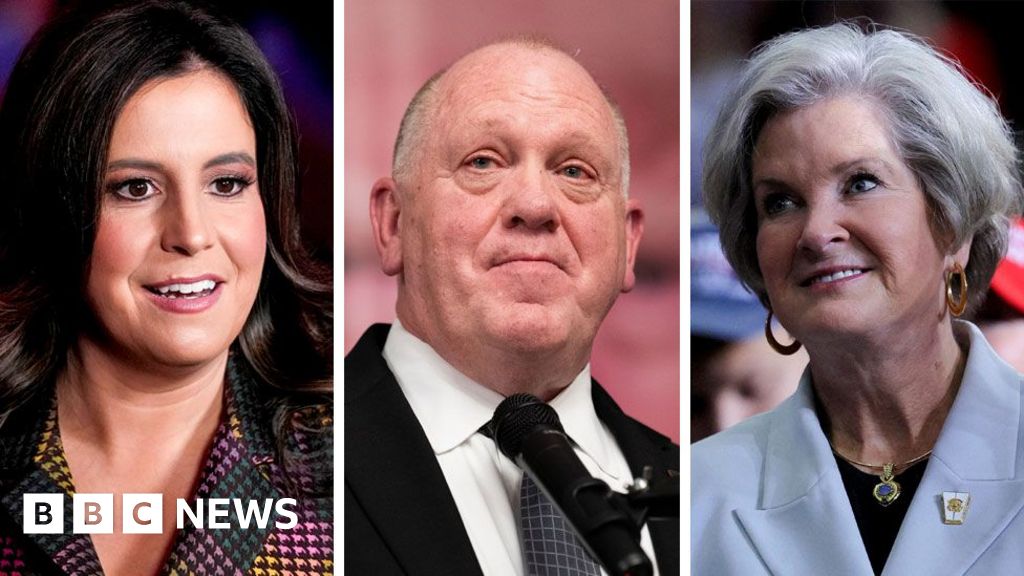
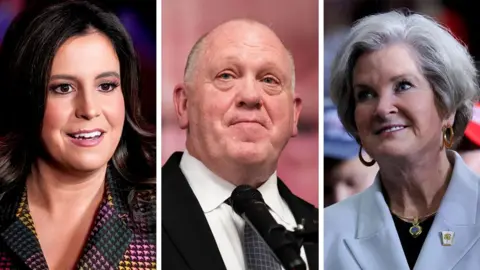 Getty Images
Getty ImagesDonald Trump has made the first official hires of his incoming administration, naming a chief of staff, a border tsar, an ambassador to the United Nations and an environmental protection agency head.
The president-elect’s transition team is vetting a series of candidates ahead of his return to the White House on 20 January 2025.
Susie Wiles, who headed his campaign, becomes the first female chief of staff, while Tom Homan, who served in the first Trump term, will play a critical role on the border and immigration.
A president is responsible for about 4,000 political appointments – a process that can take months. Here is a closer look at those posts already filled, and the names in the mix for the top jobs.
Border tsar – Tom Homan
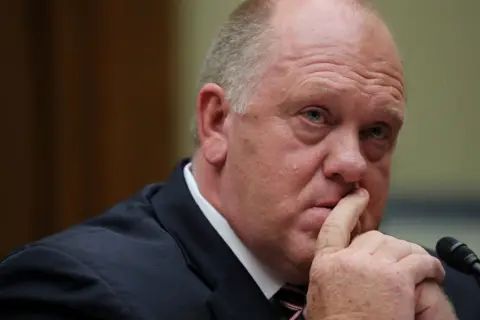 Reuters
ReutersThis is a critical job because it includes responsibility for Trump’s mass deportations of millions of undocumented migrants, which was a central campaign pledge.
Trump made the announcement on Truth Social, calling Homan a “stalwart” on border control.
The former police officer was acting director of the the US Immigration and Customs Enforcement (Ice) in Trump’s first term and he has advocated a zero-tolerance stance on the issue.
“Trump comes back in January, I’ll be on his heels coming back,” he said in July. “And I will run the biggest deportation force this country has ever seen.”
United Nations ambassador – Elise Stefanik
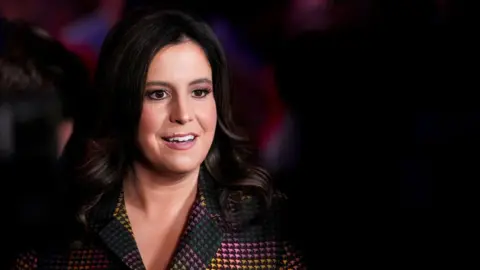 Getty Images
Getty ImagesMedia reports – confirmed by the BBC’s US partner CBS News – say the New York congresswoman has been offered the UN ambassador job.
Stefanik has made national headlines with her sharp questioning in congressional committees, first at Trump’s 2019 impeachment hearings and again this year quizzing college leaders about anti-semitism on campus.
“Elise is an incredibly strong, tough, and smart America First fighter,” Trump said in a statement to the New York Post.
Certain political appointments in the US – including the UN ambassador job – require the approval of the US Senate. But Trump has demanded that the next Senate leader let him make appointments without traditional confirmation votes.
Head of Enviornmental Protection Agency – Lee Zeldin
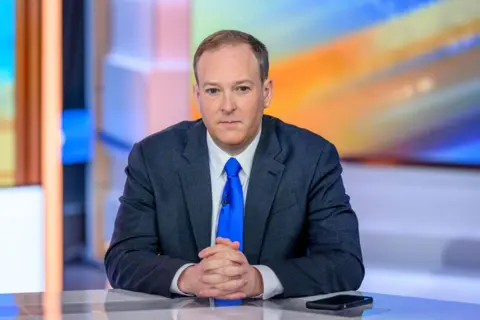 Getty Images
Getty ImagesLee Zeldin, a former New York congressman, has agreed to lead the Environmental Protection Agency, both he and Trump said. The Senate will still need to confirm his appointment.
He will be in charge of tackling America’s climate policy in this role.
“We will restore US energy dominance, revitalize our auto industry to bring back American jobs, and make the US the global leader of AI,” Zeldin said in a statement on X, formerly Twitter. “We will do so while protecting access to clean air and water.”
Zeldin has long been a Trump ally – and is one of 126 Republican members of Congress who signed onto a brief to the Supreme Court that contested the 2020 election results.
While serving in congress from 2015 to 2023, Zeldin voted against expanding a number of environmental policies. He has already said he plans to “roll back regulations” from day one.
He has not earned high marks from environmental groups for his voting record on environmental issues.
Chief of staff – Susie Wiles
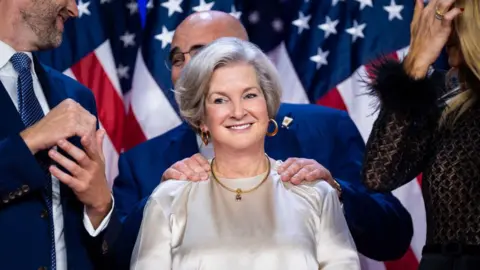 Getty Images
Getty ImagesSusie Wiles and campaign co-chair Chris LaCivita were the masterminds behind Trump’s victory over Kamala Harris.
In his victory speech, Trump called her “the ice maiden” – a reference to her composure – and said she liked to stay in the background. Wiles was the first appointment in Trump’s top team.
The chief of staff is often a president’s top aide, overseeing daily operations in the West Wing and managing the boss’s staff.
Wiles, 67, has worked in Republican politics for decades, from Ronald Reagan’s successful 1980 presidential campaign to electing Rick Scott and Ron DeSantis as governors of Florida.
Republicans have said she commands respect and has an ability to corral the big egos of those in Trump’s orbit, which could enable her to impose a sense of order that none of his four previous chiefs of staff could.
Attorney general
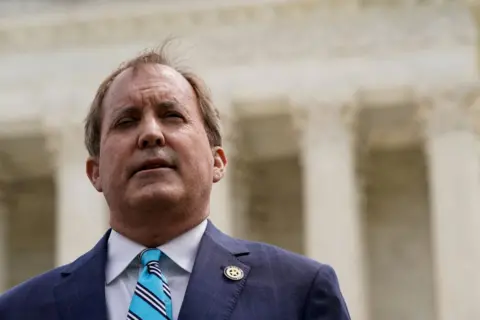 Reuters
ReutersNo personnel decision may be more critical to the trajectory of Trump’s second term than his appointee to lead the Department of Justice.
After uneven relationships with both Jeff Sessions and William Barr, the attorneys general during his first term, Trump is widely expected to pick a loyalist who will wield its prosecutorial power in the manner of an “attack dog”.
Among the names being floated for the cabinet post are Aileen Cannon, the Trump-nominated federal judge who threw out his classified documents case; ex- justice department lawyer Jeffrey Clark, who is alleged to have aided Trump’s efforts to overturn the 2020 election results; Texas Attorney General Ken Paxton, who has been both indicted and impeached like Trump; Matthew Whitaker, the man who took over for three months as acting attorney general after Sessions stepped down at Trump’s request; Mike Davis, a right-wing activist who once clerked for Supreme Court Justice Neil Gorsuch and has issued bombastic threats against Trump critics and journalists; and Mark Paoletta, who served in Trump’s budget office and argues there is no legal requirement for a president to stay out of justice department decisions.
Secretary of state
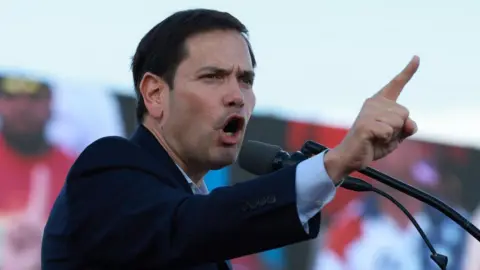 Getty Images
Getty ImagesThe US secretary of state is the president’s main adviser on foreign affairs, and acts as America’s top diplomat when representing the country overseas.
Florida Senator Marco Rubio – who was most recently under consideration to be Trump’s vice-president – is a major name being floated for the key cabinet post.
Rubio, 53, takes a hawkish view of China. He opposed Trump in the 2016 Republican primary but has since mended fences. He is a senior member of the Senate foreign relations committee and vice-chairman of the chamber’s select intelligence panel.
Other contenders for the job include biotech entrepreneur and 2024 Republican presidential candidate Vivek Ramaswamy; Trump’s former national security adviser Robert O’Brien; Tennessee Senator Bill Hagerty, who was previously Trump’s ambassador to Japan; and Brian Hook, the hawkish special envoy to Iran in Trump’s first term and the man who is leading the transition effort at the State Department.
A dark horse for the nomination, however, is Richard Grenell, a loyalist who served as ambassador to Germany, special envoy to the Balkans and acting national intelligence chief. Grenell, 58, was heavily involved in Trump’s efforts to overturn his 2020 election defeat and even sat in on his private meeting with Ukrainian President Volodymyr Zelensky in September.
Intelligence/national security posts
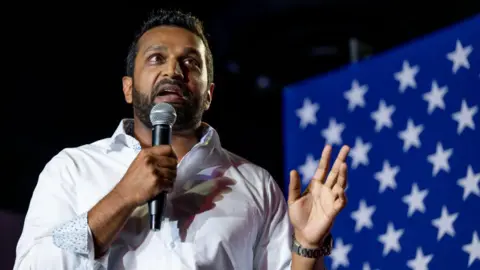 Getty Images
Getty ImagesGrenell’s combative style may make him a better fit for national security adviser – a position that does not require Senate confirmation – than secretary of state.
Also in line for major posts in a second Trump term are former Director of National Intelligence John Ratcliffe; Keith Kellogg, a national security adviser to Trump’s first Vice-President Mike Pence; former defence department official Eldridge Colby; and Kash Patel, a loyalist who staffed the national security council and became chief of staff to the acting secretary of defence in Trump’s final months in office.
Patel, 44, who helped block the transition to the incoming Joe Biden administration in the latter role, is tipped to become the Central Intelligence Agency (CIA) chief.
Trump has also said he would fire Federal Bureau of Intelligence (FBI) Director Chris Wray, who he nominated in 2017 but has since fallen out with. Jeffrey Jensen, a former Trump-appointed US attorney, is under consideration to replace Wray.
Defence secretary
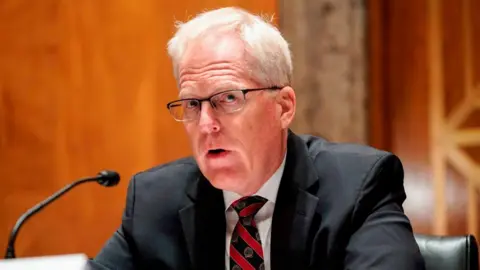 Getty Images
Getty ImagesTrump has previously singled out Christopher Miller, his final acting defence secretary, as a candidate who could be nominated to lead the military.
Miller, a retired Army Special Forces colonel, ran the National Counterterrorism Center and – more recently – authored the defence chapter of the controversial Project 2025 wish list for a second Trump term, though Trump has distanced himself from the document.
Other names being discussed include Michael Waltz, a Florida lawmaker who sits on the armed services committee in the US House of Representatives, and Robert O’Brien.
Treasury secretary
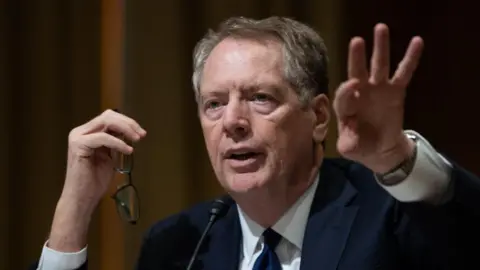 Getty Images
Getty ImagesTrump is reportedly considering Robert Lighthizer, a free trade sceptic who led the tariff war with China as the US trade representative, as his chief financial officer.
But at least four others may be under consideration for the role, including Scott Bessent, a billionaire hedge fund manager who has become a major fundraiser and economic adviser to the president-elect; John Paulson, another megadonor from the hedge fund world; former Securities and Exchange Commission (SEC) chair Jay Clayton; and Fox Business Network financial commentator Larry Kudlow, who ran Trump’s national economic council during his first term.
Commerce secretary
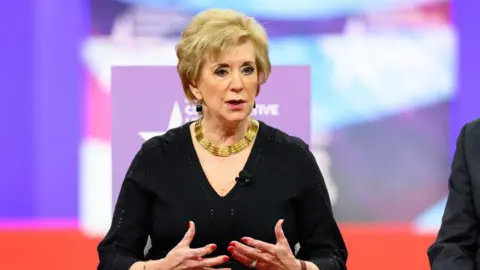 Getty Images
Getty ImagesThe woman co-chairing Trump’s transition team, Linda McMahon, is tipped as a key contender to represent US businesses and job creation in his cabinet – after previously serving as small business administrator during his first term.
Others who could fill this vacancy include Brooke Rollins; Robert Lighthizer; and Kelly Loeffler, a wealthy businesswoman who briefly served in the US Senate.
Interior secretary
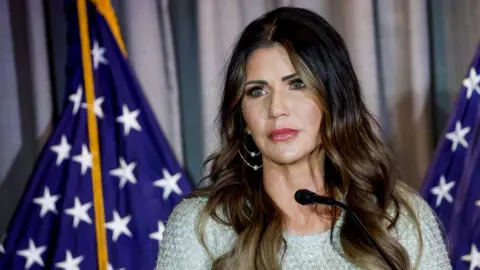 Getty Images
Getty ImagesSouth Dakota Governor Kristi Noem – who was passed over to be Trump’s running mate in part over a bizarre admission that she killed her pet dog – could see her loyalty to him pay off with the leadership of the interior department, which manages public land and natural resources.
She may compete with North Dakota Governor Doug Burgum for the role.
Energy secretary
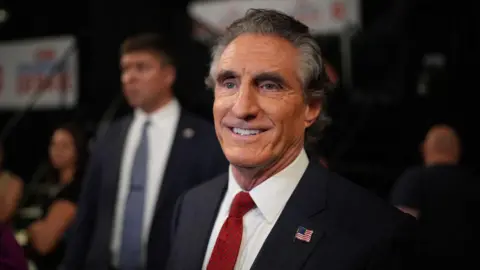 Getty Images
Getty ImagesDoug Burgum is also a contender to lead the energy department, where he would implement Trump’s pledges to “drill, baby, drill” and overhaul US energy policy.
A software entrepreneur who sold his small company to Microsoft in 2001, Burgum briefly ran in the 2024 Republican primary before dropping out, endorsing Trump and quickly impressing him with his low-drama persona and sizeable wealth.
Former energy secretary Dan Brouillette is also reportedly in the running.
Press secretary
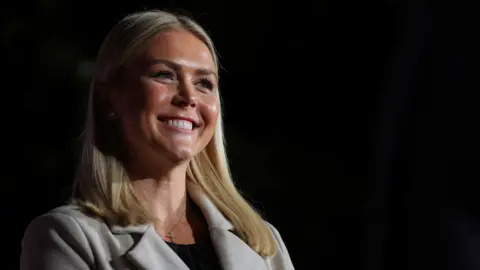 Reuters
ReutersKaroline Leavitt, 27, who impressed Trump as his campaign’s national press secretary, has already served as an assistant White House press secretary and may be a shoo-in to be the administration’s spokesperson.
Robert F Kennedy Jr
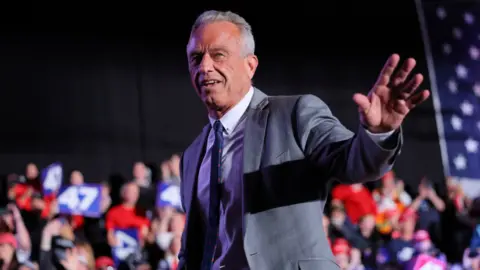 Reuters
ReutersRFK Jr, as he is known, is an environmental lawyer by trade, a vaccine sceptic by fame and the nephew of former President John F Kennedy.
He is on a shortlist to run the health and human services department, multiple people close to the president-elect’s campaign told CBS.
Despite having no medical qualifications to his name, Kennedy, 70, is expected to become a kind of “public health tsar” in the Trump administration.
There has been speculation about his inability to pass a background check for security clearance due to past controversies, including dumping a bear carcass in New York’s Central Park.
Besides a new job at the health and human services department, Kennedy could also influence policy at the agriculture department, the Environmental Protection Agency, the Centers for Disease Control and Prevention (CDC), and the Food and Drug Safety Administration (FDA).
Elon Musk
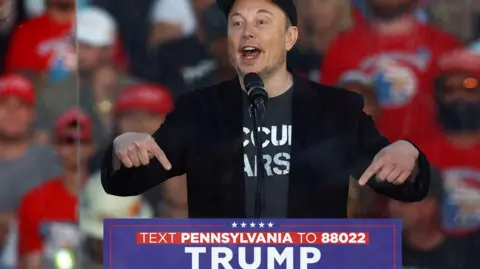 Reuters
ReutersThe world’s richest man poured millions of dollars into re-electing Trump and critics say he will now have the power to shape the regulations that affect his companies Tesla, SpaceX and X.
Both he and Trump have focused on the idea of him leading a new “Department of Government Efficiency”, where he would cut costs and streamline what he calls a “massive, suffocating federal bureaucracy”.
The would-be agency’s acronym – DOGE – is a playful reference to a “meme-coin” cryptocurrency Musk has previously promoted.
But Musk, 53, could also play a role in global diplomacy. He participated in Trump’s first call with Ukraine’s Zelensky on Wednesday.
Who will not make the cut?
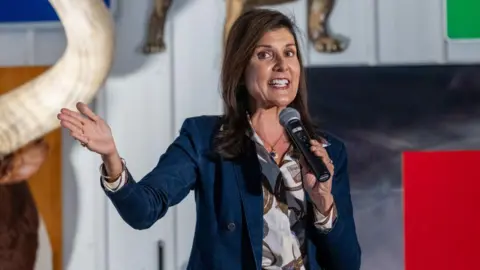 Getty Images
Getty ImagesOn Saturday, Trump announced on his Truth Social platform that he “will not be inviting former [UN] Ambassador Nikki Haley, or former Secretary of State Mike Pompeo” to work for him again.
It came one day after long-time ally Roger Stone identified the two as “neocons” likely to form a “sinister fifth column” against the Trump agenda. Haley also challenged, and harshly criticised, Trump during the 2024 Republican primary. Pompeo was considered a top contender to be defence secretary.
Arkansas Senator Tom Cotton has ruled himself out for a job as he expects to hold the third-highest rank in the new Senate Republican majority.
Also rumoured to be in the running was Utah Senator Mike Lee, who told Deseret News “I have the job I want” and Republicans must “take full advantage” of their return to power in Washington.
Related
U.S. economy adds jobs as federal layoffs and rising unemployment…
Julia Coronado: I think it's too early to say that the U.S. is heading to a recession. Certainly, we have seen the U.S. just continue t
The job listing site highlighting H-1B positions so Americans can…
A mysterious new job listings website recently went live, solely showing roles companies want to offer to their H-1B holders seeking Green Cards in an attempt t
Tepid February Jobs Report Boosts Odds of a June Fed…
Federal Reserve Board Chairman Jerome Powell speaks during a news conference. Photo by Chip ... [+] Somodevilla/Getty Images.Getty Images The February jobs repo
French university offers jobs to American scientists afraid of government…
As the current federal government in the U.S. has been freezing or cutting funding for several research grants, a French university has stepped in with an offer














